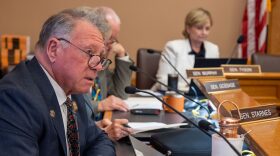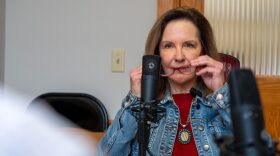A Texas lawyer who went to medical school can proceed with his lawsuit challenging the state medical board's order for him to stop calling himself a doctor on the campaign trail, the Texas Supreme Court ruled Friday.
The high court ruled the Third Court of Appeals should not have dismissed Reynaldo "Rey" Gonzalez's claims that the Texas Medical Board overstepped its authority by issuing a cease-and-desist when he called himself "Dr. Gonzalez" while running for Congress in 2020. Justices also said Gonzalez can move forward with his claim that the law the cease-and-desist was based on was unconstitutionally applied to him.
"If the Texas Medical Board thinks it has the power to police campaign speech, it will have to defend that position on the merits," Justice James Sullivan wrote for the court.
The case marks the first time the Texas Medical Board has disciplined someone for statements made during a political campaign, Sullivan wrote. KERA News reached out to both Gonzalez and the Texas Medical Board for comment and will update this story with any response.
The decision comes a little less than two months after the Texas Supreme Court heard oral arguments over the validity of Gonzalez's claims against the board.
Gonzalez graduated from medical school in 2008 and he says God led him to study law. He became a licensed attorney but never attained a medical license.
When the South Texas Republican ran for Texas' 34th Congressional District in the U.S. House of Representatives, he called himself both a physician and an attorney, according to court records. Gonzalez ultimately lost to the Democratic incumbent, in his third bid for the seat.
"For those who want to relate to the candidate, I am a physician," said the qualifications section of Gonzalez's voter guide, according to court records. "Like most doctors, I care about people. I listen. I act decisively in the best interest of my patients."
The Texas Medical Board took issue with statements like these and ordered Gonzalez to stop in 2021. The board said Gonzalez was "holding himself out" to be a licensed doctor, violating the Medical Practice Act and the Healing Arts Identification Act.
Gonzalez sued, alleging the board was trying to regulate his political speech. He said he didn't claim to be practicing medicine and is also seeking protection from future sanctions when he runs for office again.
The solution, an attorney for the board told justices, is for Gonzalez to clarify his educational background and that he's not a licensed physician.
A Travis County district court dismissed Gonzalez's lawsuit because he didn't challenge the cease-and-desist by the deadline required by the Administrative Procedure Act. An appeals court allowed one specific claim to move forward — that part of the Healing Art Identification Act is unconstitutional on its face.
The appeals court struck down two of Gonzalez's other claims: that the HAIA is unconstitutional as it's applied to him, and his claim that the medical board overstepped its authority with the cease-and-desist.
But the Texas Supreme Court ruled those claims should proceed at the trial court because Gonzalez is seeking more than just a dismissal of the cease-and-desist.
"The plain thrust of both claims is that TMB could not legally take any adverse action based on Gonzalez's describing himself as a 'physician' and 'doctor' in the course of his campaign," Sullivan wrote. "A declaration that the statutes do not apply to Gonzalez would protect him from future sanctions, not just from the cease-and-desist order."
For that reason, the high court also said the timeliness of Gonzalez's claims is irrelevant.
Although the fate of Gonzalez's case mostly relied on procedural requirements, justices appeared during oral arguments to side with him on the merits of his case, questioning the impact of the medical board's reasoning on political speech and the everyday speech of non-medical doctors with doctorate degrees.
Toluwani Osibamowo is KERA's law and justice reporter. Got a tip? Email Toluwani at tosibamowo@kera.org.
Copyright 2025 KERA







